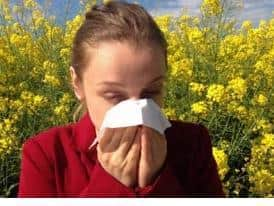Medical herbalist Nicola Parker has a good alternative hayfever remedy to antihistamines
and live on Freeview channel 276
I’ve had a lot of requests recently for a natural antihistamine. I feel like it is a little late in the summer for seasonal allergies, but the truth is that hayfever can hit during any part of the season and it’s difficult to predict when we should expect it. At my clinic we tend to see the occasional sufferer throughout the season, but there is often a point when we see a sudden influx. Runny noses, sneezing and itchy, swollen eyes become the hot topic for both over the counter advice and in my private consultation room.
Pollen levels often rise after a patch of rainy weather is followed by some early, warm summer days, ruining the glorious sunshine for all us that are sensitive to it. It is not fully understood why some people react to pollen and why others don’t, but we do know that the symptoms arise due to an over-active immune response. Histamine levels rise as your immune system responds to the pollen, causing inflammation within the sinuses. The body views the pollen as foreign and starts to wage war against this innocuous invader. It is this inflammation that makes everything itch, causing sneezing, tickly noses and itchy, puffy eyes. To sooth this irritation the nose starts running and the eyes start watering.
Advertisement
Hide AdAdvertisement
Hide AdNot everyone wants to use antihistamines for their hayfever symptoms. Some antihistamines cause drowsiness, some people find them ineffective and others are concerned about using these medicines long term. In these cases, people often turn towards herbal remedies for the relief of symptoms. While I do see people in my clinic for allergies, hay fever and allergic rhinitis, some of the most simple solutions for pollen allergies come in our over the counter remedies.


For many years now, I’ve worked with a product called Pollinosan. It comes as a nasal spray and as a small tablet that dissolves in the mouth. The Pollinosan remedy seems to keep hayfever symptoms at bay, so if you can anticipate the weather or keep your eye on the pollen count, taking it early enough means that your symptoms are less likely to start up.
If you don’t notice the pollen count rising in time, the good news is that these remedies work very quickly. Many years ago, I watched my colleague recommend these tablets to a young man. He had swollen, puffy eyes. You could see his discomfort, as rubbing them was only making the itching worse. He opened the bottle of tablets and let a few dissolve in his mouth while his partner paid and started asking about an unrelated topic.
As she turned to leave he made a joke about how he felt like they were helping already. The truth was that the swelling around his eyes had now visibly reduced. As unlikely as it seems that something could work so quickly, I had been reluctant to believe him when he said the remedy had already started working but it’s hard to argue with the visible signs. This makes it a great remedy for people caught off guard by the pollen season!
Advertisement
Hide AdAdvertisement
Hide AdSince then, I’ve spent many years recommending Pollinosan. One of the most impressive reports I get is that after taking it throughout the pollen season, symptoms the year after are either absent or dramatically reduced even without the remedy. Looking at the ingredients list (as this is not a remedy I make myself) it seems to be made with various types of plant pollens. It’s as though it can reduce the sensitivity to the pollen by helping your body respond differently to it. We don’t really understand how it works and all of the information we have on it has been built up over the years from testimonials. Due to it’s success though, it is my favourite over-the-counter remedy for pollen allergy.
l For more information, or to book an appointment, with Nicola, contact her clinic on 01524 413733.